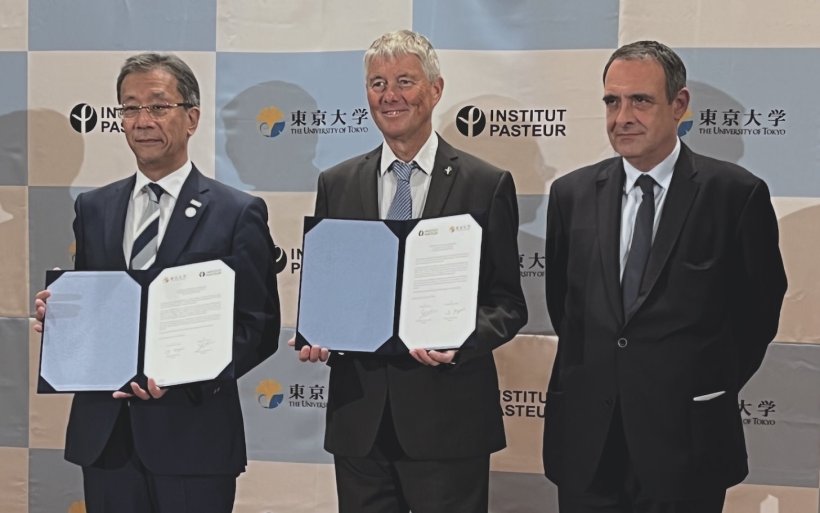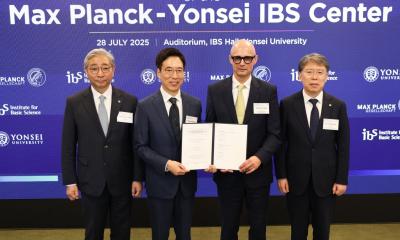© Institut Pasteur / Agnès Bourdet
News • Environmental and human health research
PHIC: A French-Japanese cooperation for planetary health
The Institut Pasteur and the University of Tokyo have signed a letter of intent (LOI) to establish the Planetary Health Innovation Center, marking the first step towards the Institut Pasteur of Japan.
At a ceremony in Tokyo this week, attended by the French Ambassador to Japan, H.E. Philippe Setton, the President of the Institut Pasteur, Professor Stewart Cole, and the President and Rector of the University of Tokyo, Professor Teruo Fujii, signed a letter of intent (LOI) to establish the Planetary Health Innovation Center (PHIC), marking the first step towards the Institut Pasteur of Japan, a private not-for-profit association.

© Institut Pasteur / Magali Lago
The PHIC is a cross-functional innovation center that will focus on finding solutions to mitigate the impact of human activity on the Earth's natural systems and will play a pivotal role in bringing together French and Japanese health innovation stakeholders. To achieve these goals, the PHIC will support academic-private partnerships, help further international career and business development in the biosciences, and connect stakeholders from France and Japan within innovation for health research. In addition to the PHIC, the Institut Pasteur of Japan will host scientific teams dedicated to human and environmental health research on a global scale, with the aim of training and teaching future generations of researchers, and promoting innovation and knowledge transfer to achieve global health.
With the PHIC as a hub, we will conduct research expanding into the field of planetary health, including the health of the global environment. This field is very important in the future society and is of great interest worldwide
Teruo Fujii
In a speech delivered at the signing ceremony, Professor Stewart Cole, President of the Institut Pasteur, stated: “In my opinion, the integration of the Institut Pasteur of Japan into the Japanese research ecosystem is essential if we are to realize our scientific ambitions. I am delighted to see the current successful collaborations with numerous Japanese academic and industrial players. I am convinced that our partnership with the University of Tokyo will enable us to develop excellent cooperation for the benefit of global health.”
Professor Teruo Fujii, President of the University of Tokyo, declared: “We are pleased to begin a new collaboration with the Institut Pasteur, one of the world's leading institutions. With the PHIC as a hub, we will conduct research expanding into the field of planetary health, including the health of the global environment. This field is very important in the future society and is of great interest worldwide. In order to foster the next generation, we will actively engage in activities such as exchanges between young researchers and training for graduate students. We would like to create the PHIC as a place for collaboration with companies, creation of startups, and incubation of entrepreneurship.”
French Ambassador to Japan, H.E. Philippe Setton, concluded: “Today's signing of the Letter of Intent between the Institut Pasteur and the University of Tokyo marks a new stage in the development of this cooperation, with the prospect of the physical creation of the new Institut Pasteur of Japan. In addition to its scientific ambition, this project has a strategic dimension that is supported by the French authorities and, on their behalf, by the Embassy and its scientific service. This future Institute will serve as a framework for cross-disciplinary scientific collaborations that will bring together complementary fields of research, thus facilitating new opportunities for collaboration as well as funding with Japanese academic and private partners.”
Source: Institut Pasteur
05.10.2023





